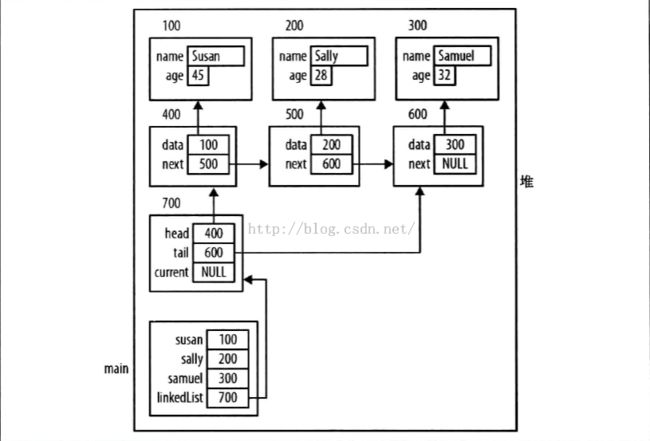链表
//////////////////////////////////////////////////
//LinkList
//////////////////////////////////////////////////
typedef void (*DISPLAY)(void*);
typedef int (*COMPARE)(void*,void*);
typedef struct _employee{
char name[32];
unsigned char age;
}Employee;
/*
Node结构体定义一个节点,有两个指针,第一个是void指针,持有任意类型的数据,
第二个是指向下一个结点指针
*/
typedef struct _node{
void *data;
struct _node *next;
}Node ;
/*
LinkedList结构体表示链表,持有指向头节点和尾节点的指针,当前指针用来辅助遍历链表
*/
typedef struct _linkedList{
Node *head;
Node *tail;
Node *current;
}LinkedList;
void initializeLinkList(LinkedList *);//初始化
void addHead(LinkedList*,void *); //增加头节点数据
void addTail(LinkedList *,void *); //增加尾节点数据
void delete(LinkedList *,Node*); //删除结点
Node *getNode(LinkedList *,COMPARE,void*);//返回指定节点的指针
void displayLinkedList(LinkedList *,DISPLAY);//打印链表
void initializeLinkList(LinkedList *list){
list->head = NULL;
list->tail = NULL;
list->current = NULL;
}
/*
1.查链表是否为空,如果空,把尾指针指向节点,然后把节点next字段赋值为NULL
2.如果不空,将节点的next指向链表头
3.无论哪种情况,链表头都指向节点
*/
void addHead(LinkedList *list,void *data){
Node *node = (Node *)malloc(sizeof(Node));
node->data = data;
if (list->head ==NULL) {
list->tail = node;
node->next = NULL;
}else{
node->next = list->head;
}
list->head = node;
}
/*
1.因总是将节点添加到末尾,即该节点的next字段被赋值NULL
2.如果链表空,head指针就是NULL,把新节点赋给head
2.如果不空,尾节点的next指针赋为新节点
3.无论哪种情况,链表tail指针都赋为该节点
*/
void addTail(LinkedList *list,void *data){
Node *node = (Node *)malloc(sizeof(Node));
node->data = data;
node->next = NULL;
if (list->head ==NULL) {
list->head = node;
}else{
list->tail->next = node;
}
list->tail = node;
}
/*
为了保持函数简单,不检查链表内的空值和传入的节点
1.第一个if处理删除头节点,如果头节点是唯一节点,那么将头节点和尾节点置为NULL,否则,
头节点赋为原头节点的下一节点
2.tmp指针从头到尾遍历链表,不论是将tmp赋值为NULL,还是tmp的下一节点就是要找的节点。
3.tmp为空,表示要找的节点不在链表中
4.函数末尾,将节点释放
*/
void delete(LinkedList *list,Node*node){
if (node==list->head) {
if (list->head->next ==NULL) {
list->head=list->tail=NULL;
}else{
list->head=list->head->next;
}
}else{
Node *tmp = list->head;
while (tmp!=NULL && tmp->next !=node) {
tmp = tmp->next;
}
if (tmp!=NULL) {
tmp->next = node->next;
}
}
free(node);
}
int compareEmployee(Employee *e1,Employee *e2){
return strcmp(e1->name, e2->name);
}
void displayEmployee(Employee *employee){
printf("%s\t%d\n",employee->name,employee->age);
}
Node *getNode(LinkedList *list,COMPARE compare,void *data){
Node *node = list->head;
while (node!=NULL) {
if (compare(node->data,data)==0) {
return node;
}
node=node->next;
}
return NULL;
}
void displayLinkedList(LinkedList *list,DISPLAY display){
printf("\nLinked List\n");
Node *current = list->head;
while (current!=NULL) {
display(current->data);
current=current->next;
}
}
int main(int argc,constchar * argv[]) {
@autoreleasepool {
//LinkList
LinkedList linkedList;
Employee *samuel = (Employee *)malloc(sizeof(Employee));
strcpy(samuel->name,"samuel");
samuel->age = 32;
Employee *sally = (Employee *)malloc(sizeof(Employee));
strcpy(sally->name,"sally");
sally->age = 28;
Employee *susan = (Employee *)malloc(sizeof(Employee));
strcpy(susan->name,"susan");
susan->age = 56;
initializeLinkList(&linkedList);
addHead(&linkedList, samuel);
addHead(&linkedList, sally);
addHead(&linkedList, susan);
displayLinkedList(&linkedList, (DISPLAY)displayEmployee);
Node *node = getNode(&linkedList, (int(*)(void*,void*))compareEmployee, susan);
delete(&linkedList, node);
displayLinkedList(&linkedList, (DISPLAY)displayEmployee);
return 0;
}
}
//增加
//删除
